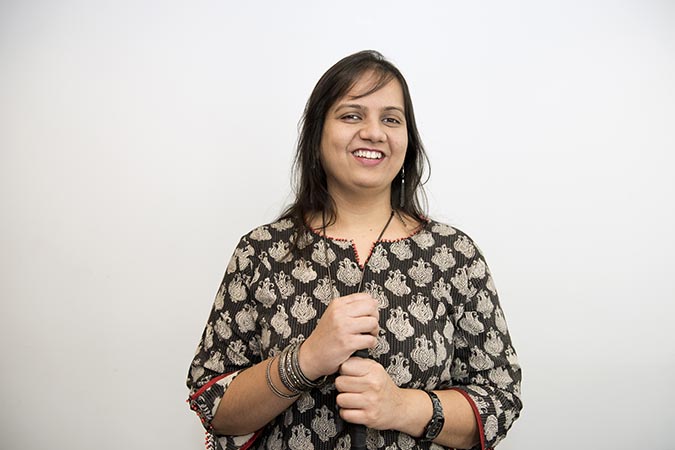In the words of Nidhi Goyal: “These spaces belong to everyone”
Date:

Nidhi Goyal, 32, is a disabled feminist from India who works on disability rights and gender equality. After losing her sight as a teenager, Goyal committed herself to changing the lives of persons with disabilities, and particularly women and girls with disabilities. As a researcher, writer, trainer, stand-up comedian and advocate, she works to raise awareness on the intersection of the disability rights movement, and the women’s movement. She is the founder of the non-profit organization, Rising Flame and a member of the Civil Society Advisory Group to UN Women Executive Director Phumzile Mlambo-Ngcuka. While in New York for the Conference of States Parties to the Convention of the Rights of Persons with Disabilities, Goyal spoke to UN Women about her work.
The more I was turning blind and losing my sight, the more clearly I could see how inaccessible and unsupportive the world was.
As an activist, I'm so proud of all the people in this world, particularly people with disabilities, women with disabilities, who wake up every morning knowing that the world is inaccessible; that the world is hostile; that they'll have to face multiple barriers. I'm very proud of all my fellow women with disabilities, who wake up, and say okay, I'll face all the risks, because I have to live a life.
I was 15 when I was diagnosed with an incurable irreversible eye disorder which would render me blind. I had a supportive family, who really held me up when everything should have been falling down around me. I had supportive family, and the capability to deal with a lot of the inaccessibility around me. I realized that not everyone has this, so I thought, one day I’ll do something about it. It really sowed the seeds of my activism.
I looked around and saw that some talk of access is happening. There is some talk of employment and livelihoods for people with disabilities, but where is the talk about the gender side of things? Where is the talk about sexuality and reproductive health and rights?
Women with disability are so often seen as asexual, and we need to establish that they have a sexuality on par with other women. And then address the specific challenges they face. For example, comprehensive sexuality education, access to sexual health, or just access to hospitals.
When you talk about violence against women with disabilities, it’s different, there are unique and different forms of violence that women with disability face. Forced sterilization is not a very common thing you hear otherwise, but it’s rampant when it comes to women and girls with disabilities. But then also with the violence that women face generally, no one is looking at how that affects women with disabilities specifically. For example, Female Genital Mutilation (FGM)—are girls with disability facing FGM? Are their chances of avoiding, or running away and being rescued harder? Or is it easier? Is anyone looking at that? How can we extend the work already being done to include women and girls with disabilities?
It worked really well to come from the women’s rights movement and say ‘hey, women with disability are women too, and they are having these issues and you need to acknowledge it’. Women with disabilities are not falling so much between the cracks between to the two movements (women’s movement and disability rights movement) now. However, it’s still a challenge. It’s still a conversation in every space. We’re still in a phase now where we’re saying this needs to be recognized.
For me, the real victory will be when you have to stop justifying that women with disability belong to both movements. That’s when we know the cracks will be filled. When I don’t have to justify that different groups have to engage with women with disability, or point out that a women’s conference or a conference on gender equality has a .001 per cent participation by women with disabilities. We need to start opening up those spaces and dialogues.
We need to start with the premise that these spaces belong to everyone.”